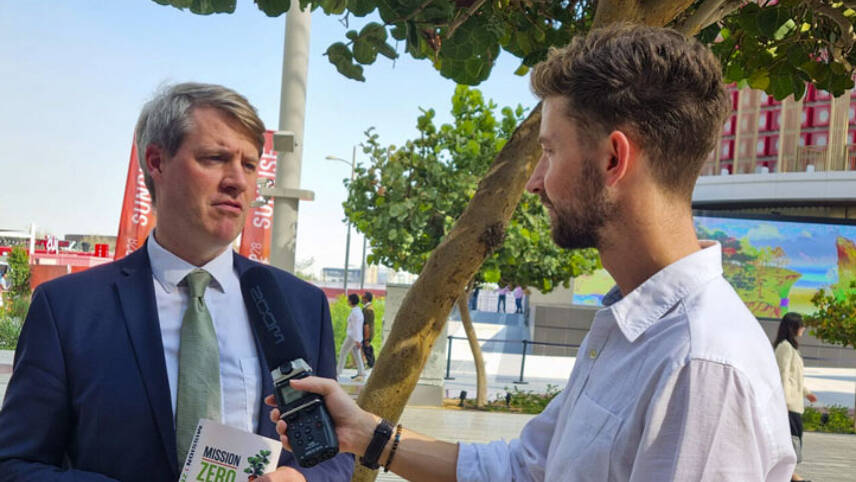Register for free and continue reading
Join our growing army of changemakers and get unlimited access to our premium content
Speaking exclusively to edie in the Green Zone of COP28, the UN-convened climate summit in Dubai, Skidmore gave edie’s publisher Luke Nicholls his thoughts on negotiations so far.
The big debate at the moment is whether the final text, due to be agreed on 12 December, will commit nations to ‘phasing out’ or ‘phasing down’ fossil fuels.
Discussions also continue around whether the agreement should cover all oil and gas or only that which is not ‘abated’ by carbon capture.
Skidmore said that after the initial “flurry of announcements, some of them fantastic” – including the Loss and Damage Fund – “people want to focus on 1.5C” and the COP28 Presidency risks becoming “embattled” in debates over language.
“They know that we’re not going to hit 1.5C unless we have that ‘phase-out’ language in the text with no exceptions or exemptions.”
Britain’s negotiating position
The UK is not pushing for a phase-out of fossil fuels at COP28, Energy Security and Net-Zero Minister Graham Stuart confirmed shortly before the summit began. He told MPs that Britain would support a ‘phase down of fossil fuel emissions’ in a bid to get a broad global consensus.
Nations like Saudi Arabia are already pushing hard on COP28 final texts that would permit carbon capture, but the most climate-impacted nations including Small Island Developing States will dig their heels in for a phase-out. It was ultimately the tireless work of these nations that saw 1.5C included in the Paris Agreement in 2015.
Stuart’s comments were made just a day after the King’s Speech, through which it was confirmed that the Government will enshrine in law a requirement for annual oil and gas licencing rounds.
Skidmore did not vote to back the measures included in the Speech for this reason.
Skidmore told edie: “I think the cost of that is going to be incredibly dramatic internationally. Because, if the UK won’t commit, having been the leader in decarbonising the G20, then why should any other country do so?”
The Net-Zero Review concludes that there will be a place for oil and gas in the UK’s energy mix for decades to come. Fossil fuels are also needed to make a range of consumer products. But it states that this demand can be met using existing reserves, without expanding extraction.
Moreover, the Net-Zero Review existing facilities should make a more concerted effort to implement more cost-effective interventions than carbon capture, the review states, to reduce routine venting and flaring. This is a key source of methane.
Skidmore explains to edie that the UK would benefit from a final end date for existing reserves, too. This would send a strong message on the international stage.
He says: “You should come to COP trying to move the agenda forward. And I’m not sure I could say what the UK has brought in as a new policy framework…. That is a missed opportunity.
“Rishi Sunak’s argument is that we’re still leading, that we lead the G20 [on decarbonising power]. And that’s great. And we do. But you can’t stand still. You’ve got to continue to press forward, and other countries have filled that vacuum.”



Please login or Register to leave a comment.